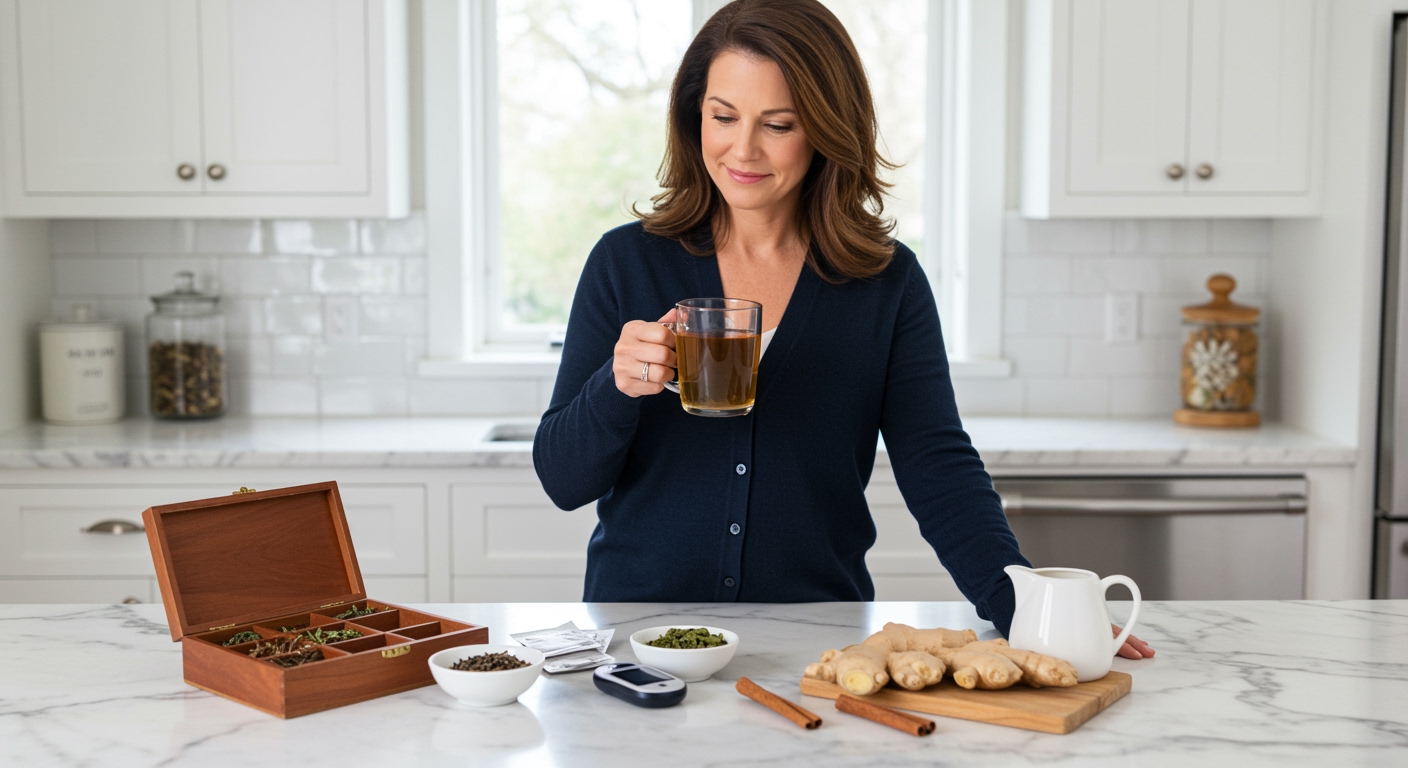✪ Key Takeaway: Most teas are excellent for diabetes, but avoid sweetened varieties and choose green, black, or herbal teas instead.
Introduction
Your morning cup of tea might be doing more for your blood sugar than you realize.
Many people with diabetes wonder if their favorite warm beverage could be sabotaging their glucose control or actually helping it.
Hi, I’m Abdur, your nutrition coach and today I’m going to explain exactly how different types of tea affect your blood sugar and which ones deserve a permanent spot in your daily routine.
How Does Tea Actually Affect Blood Sugar?
Plain tea contains virtually zero carbohydrates, which means it has minimal direct impact on your blood glucose levels.
The magic happens through bioactive compounds called polyphenols that work behind the scenes to improve your body’s glucose metabolism.
These natural chemicals help your cells become more sensitive to insulin, which means your body can use glucose more effectively.
Research shows that regular tea consumption can slow down the absorption of carbohydrates from your digestive system into your bloodstream.
This slower absorption prevents those dangerous blood sugar spikes that diabetics work so hard to avoid.
✪ Fact: Green tea can reduce post-meal blood sugar spikes by up to 30% when consumed with carbohydrate-rich foods.
Which Tea Types Work Best For Diabetes Management?
Green tea stands out as the champion for blood sugar control due to its high concentration of epigallocatechin gallate, a powerful antioxidant.
Studies demonstrate that people who drink green tea regularly show improved glucose tolerance and lower fasting blood sugar levels.
Black tea offers similar benefits through different mechanisms, containing theaflavins that help regulate glucose metabolism.
Oolong tea provides a middle ground between green and black tea, offering unique polyphenols that specifically target fat metabolism alongside glucose control.
Herbal teas like chamomile, cinnamon, and ginger bring their own glucose-lowering properties without any caffeine concerns.
White tea, though less studied, contains the highest levels of antioxidants and shows promise for diabetes prevention and management.
✪ Pro Tip: Drink your tea 30 minutes before meals to maximize its blood sugar-lowering effects.
What About Tea Preparation and Timing?
The way you prepare your tea dramatically affects its therapeutic potential for diabetes management.
Steeping time matters because longer brewing extracts more beneficial compounds, with 3-5 minutes being optimal for most teas.
Water temperature plays a crucial role too, as boiling water can destroy delicate antioxidants in green and white teas.
Timing your tea consumption around meals can enhance its glucose-lowering effects significantly.
Drinking tea between meals helps maintain steady blood sugar levels throughout the day.
Cold brewing preserves more antioxidants and creates a smoother taste that many diabetics find more palatable for regular consumption.
✪ Note: Never add sugar, honey, or artificial sweeteners to maximize tea’s blood sugar benefits.
Are There Any Tea-Related Risks For Diabetics?
Most tea-related problems for diabetics come from added ingredients rather than the tea itself.
Sweetened teas, bubble teas, and flavored tea drinks can contain massive amounts of hidden sugars that spike blood glucose dangerously.
Caffeine sensitivity varies among individuals, and excessive intake can cause stress hormones that temporarily raise blood sugar.
Some herbal teas may interact with diabetes medications, particularly those containing licorice root or ginseng.
Milk and cream additions can add unexpected carbohydrates that accumulate throughout the day if you drink multiple cups.
Tea bags sometimes contain added flavors or sweeteners that manufacturers do not clearly label on packaging.
✪ Pro Tip: Always read ingredient lists on tea packages to avoid hidden sugars and artificial additives.
How Much Tea Should Diabetics Drink Daily?
Research suggests that 3-4 cups of tea daily provides optimal benefits for blood sugar management without overdoing caffeine intake.
This amount delivers enough polyphenols to meaningfully impact glucose metabolism while staying within safe caffeine limits.
Spreading your tea consumption throughout the day maintains steady levels of beneficial compounds in your bloodstream.
People sensitive to caffeine should limit themselves to 2 cups of caffeinated tea and supplement with herbal varieties.
Starting with one cup daily and gradually increasing allows your body to adapt to the compounds and maximize benefits.
Quality matters more than quantity, so choosing high-grade teas will provide better results than drinking large amounts of low-quality options.
The Bottom Line
Tea emerges as one of the most diabetes-friendly beverages you can choose, offering genuine blood sugar benefits when consumed properly.
Good health starts with simple daily choices, and choosing tea over sugary drinks is one of the easiest wins you can achieve.
I would love to hear about your favorite tea varieties and how they fit into your diabetes management routine, so please share your experiences in the comments below.
References
At NutritionCrown, we use quality and credible sources to ensure our content is accurate and trustworthy. Below are the sources referenced in creating this article:





